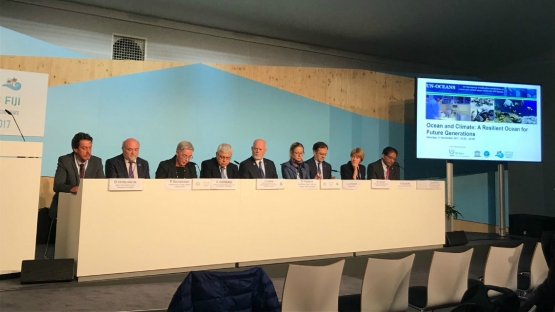The IAEA participated in a UN Oceans side-event at the United Nations Framework Convention on Climate Change (UNFCCC) COP23 in Bonn on ocean and climate entitled “A Resilient Ocean for Future Generations”. The objective of the 11 November side-event was to present actions that countries are taking, with the support of the UN system, to address climate-related multi-stressors on the ocean through improved scientific capacity, the development of CO2 mitigation strategies and new innovative adaptation approaches.
Peter Thomson, the first UN Special Envoy for the Oceans, appointed in September 2017, provided remarks and stressed that “we have to talk of ocean change like we talk of climate change".
During the session, Mr Deon Terblanche from the World Meteorological Organization presented its latest Greenhouse Gas Bulletin, according to which carbon dioxide (CO2) concentrations in the atmosphere have increased by 145% as compared to pre-industrial (before 1750) levels. This is causing changes in the world we live in with knock-on effects on the oceans and marine ecosystems.
About a quarter of the CO2 emitted through human activities is taken up by the ocean. This is causing a change in the ocean’s chemistry, a process known as ocean acidification. Since the beginning of the industrial revolution, ocean acidity has increased by 26% and the current rate of acidification is over 10 times faster than any time in the last 55 million years.
Peter Swarzenski, from the IAEA Environment Laboratories stressed that “we all have an important role to play in ocean action. IAEA research provides insight into ocean processes and can be used by Member States to make informed decisions and take action”. He added that “it is not too late. We can avoid irreversible consequences for the oceans and the communities that depend on them”.
Recent research, including that done by the IAEA, shows that ocean acidification effects on fisheries, aquaculture and coral reefs are expanding, both in terms of geographical location and intensity. Some effects are direct such as on species’ physiology: growth, reproduction and calcification, while others may be indirect: impact on food sources, habitat degradation, changes in the food chain structure, for example.
Nuclear and isotopic techniques are powerful tools to study ocean acidification and have contributed widely to investigating past changes in ocean acidity and potential impacts on marine organisms. Researchers at the IAEA Environment Laboratories use calcium-45 to examine the growth rates in calcifying organisms such as corals, mussels and other molluscs, whose skeletons and shells are composed of calcium carbonate. Tracers are also used to determine how ocean acidification is affecting the physiology of marine organisms, as well as the impact of multiple combined stressors, such as ocean acidification and increases in temperature and contaminants.
The IAEA laboratories in Monaco also host the Ocean Acidification International Coordination Centre (OA-ICC), which works with many international partners to advance ocean acidification monitoring, research and capacity-building around the world. Vladimir Ryabinin, Executive Secretary of the Intergovernmental Oceanographic Commission of UNESCO highlighted how IOC-UNESCO and the IAEA OA-ICC are collaborating closely to support the Global Ocean Acidification Observing Network (GOA-ON), a global platform launched in 2012, which brings together researchers working on ocean acidification monitoring.
“Oxygen in the ocean decreases, sea water is acidifying, and sea level is rising. We know this, and can make projections for the future, because of systematic ocean observations and science,” argued Mr Ryabinin.
Ultimately, these efforts contribute to equip countries to respond to Sustainable Development Goal 14 dealing with Ocean change, and it’s Target 3, specifically addressing ocean acidification.
The side-event was coordinated by the Intergovernmental Oceanographic Commission of UNESCO and the IAEA with representatives from UN Environment, FAO, IMO, the UNESCO World Heritage Centre and the WMO.
We have to talk of ocean change like we talk of climate change.





